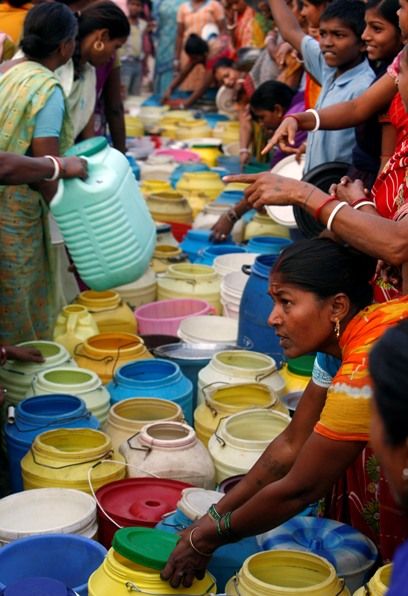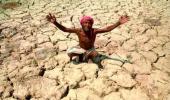
Growth and development in India will be governed by the way water is used and managed. On World Water Day, Romit Sen and Kamal Vatta analyse how a proper framework can ensure the safety and sustainability of this resource
Water has been at the centre stage of the development and political debate. Growing scarcity; increasing pollution; enhanced competition, conflicts and trans-boundary water sharing issues have dominated the national discourse in current times.
Recent policies and programmes of the central government indicate an increased impetus on addressing some of the major concerns facing the sector.
Given the complexities associated with the management and governance of water resources, an effective framework on how we can better manage and use our water resources appears challenging.
However, certain fundamental aspects need to be addressed if we are to ensure the safety and sustainability of this precious resource.
The first among these is a comprehensive assessment of water resources in India.
The last time a comprehensive assessment of water resources for the entire country was done was in 1999-2000.
The planning of water resources needs to be based on updated data and it is time that a complete assessment on water availability, use and future demand is carried out.
A large share of our water needs is met by groundwater.
Groundwater depletion has become a serious problem, with aquifers across the country moving into the over-exploited zone.
There is a Budget allocation of Rs 6,000 crore (Rs 60 billion) for undertaking a major programme for sustainable management of groundwater resources in 2016.
However, one must address the fundamental problem of limiting groundwater extraction.
There are no exact estimates on the number of groundwater extraction units in the country and the number of observation wells is far too less.
There is an urgent need to increase the number of observation wells across different regions to get an accurate estimate of groundwater levels.
Deteriorating groundwater quality has also been an area of concern.
This makes a large section of our population, depending on groundwater as their major source of drinking water, vulnerable.
The Central Ground Water Board in its assessment has indicated that India faces the problem of arsenic, fluoride, nitrate and heavy metal contamination.
While the cause of groundwater pollution is both natural and anthropogenic, the management options have to look at a complete profiling of aquifers, conjunctive use of surface and groundwater and programmes for rainwater harvesting and aquifer recharge.
Improving water-use efficiency is the need of the hour and is crucial for reducing the dependence on freshwater sources.
Agriculture accounts for 85 per cent of the total water use and therefore, resource optimisation in this sector is vital. Water-use efficiency in agriculture can be brought about by the adoption of low-cost technologies.
It is also important that measures for bringing efficiency in the urban and industrial sector are implemented through better demand management and effective recycling and reuse.
The initiative of setting up a Bureau of Water Use Efficiency is an innovative step.
The Ministry of Water Resources has been working for the past four years to set up a National Bureau of Water Use Efficiency. The National Water Mission had a target of improving water-use efficiency by 20 per cent by March 2017.
However, little headway appears to have been made in these areas and it is time that efforts are undertaken to revive these initiatives.
Water has an economic value in all its uses and thus should be recognised as an economic good.
Therefore, suitable pricing mechanisms need to be developed.
Pricing of water has always been a politically sensitive issue but it is high time we recognised the need to bring financial stability in our water utilities. An important prerequisite would be to set standards for water pricing according to the ability to pay.
Pricing should be looked upon as a critical input for activities such as agriculture, industrial and domestic use and as a means to increase the financial stability of water projects, which do not exclude the provision of water to the poor and the marginalised.
One of the arguments cited for the current state of affairs in the water sector relates to the governance of water spanning across different departments and ministries, both at the central and state levels. A few years back, the central government proposed the idea of having a National Water Framework Law.
This was opposed by the state governments because they saw it as an infringement of Constitutional provisions that mention water to be a state subject, giving rights to the state to frame legislations on water.
In December 2015, a committee was constituted to examine the provisions of the draft National Water Framework Law and suggest changes/modifications therein, taking into account inter-alia the emerging challenges in the water sector, reuse of wastewater, the likely impact of climate change on water resources and the importance of river restoration/rejuvenation among others.
Given the enormity of the challenges the water sector faces; given the fact that water is a resource that has a strong inter-relationship between natural and anthropogenic activities and given the urgency that our interventions on managing water needs to be synchronised across users, departments, states and government, a framework law with basic principles for alignment of legislations sounds rational.
The objective of celebrating World Water Day on March 22 every year with a pledge to conserve water will be successful only if we remember the fundamental: water cycle and life cycle are one.
Our existence, growth and development will be governed by the way we use and manage water in the times to come.
Image: Residents of a slum stand with empty water containers as they wait to collect drinking water from a tanker at a roadside in Kolkata. Photograph: Parth Sanyal/Reuters
Romit Sen is deputy director and Kamal Vatta is director at Centers for International Projects Trust










 © 2025
© 2025